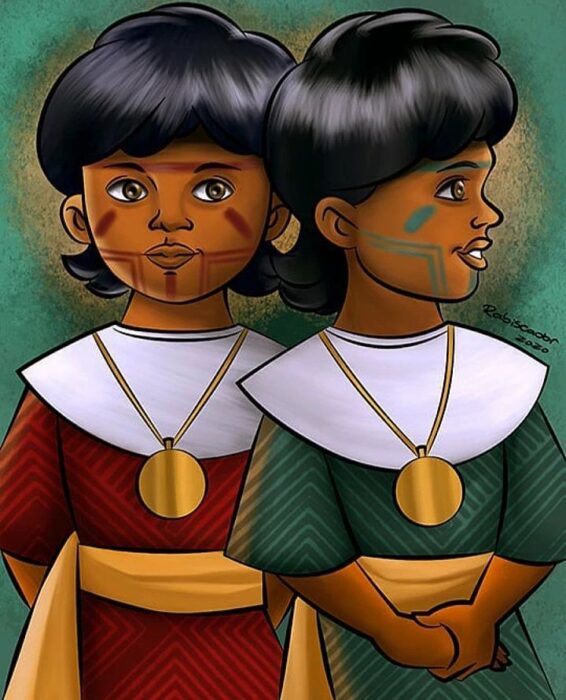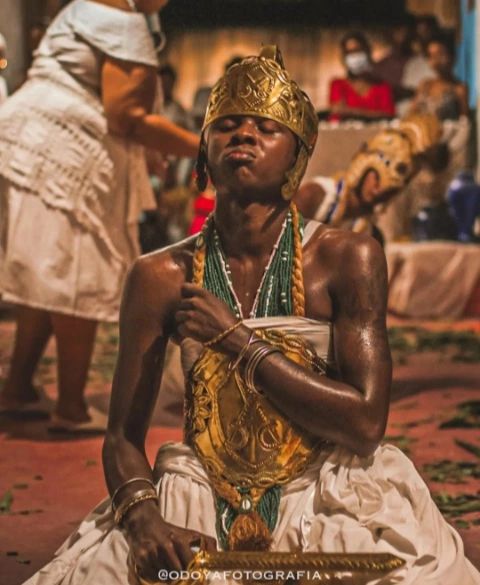Oriki Ibeji In Yoruba – Mystery Of The Yoruba Oriki For Twin – It is an open truth that yoruba land is the home of twins – we sure have them in abundance. Nonetheless, this is dedicated to all twins.
The Yoruba region is well respected and dubbed the “home of twins.” The Yoruba people are said to have the world’s highest rate of twin births.

Because of its abnormally high rate of twin birth, Igbo-Ora, a small village in Oyo state, has been dubbed the “Twin Capital of the World.” There are 158 twins per 1000 births in the town, according to reports. One of the town’s residents once bragged that every household had at least one twin.
In Yoruba, the twins are referred to as Ibeji. In the Yoruba religion of the Yoruba people of Nigeria, Ibeji is the name of an Orisha (god) who represents a pair of twins. However, in Latin American religiosity, the Yorubas identify twins with Saints Cosmas and Damian.
Twins are considered magical in Yoruba theology and culture, and are protected by the god (Orisha) Shango.
The firstborn of the twins is known as Taiwo in Yoruba, while the second is known as Kehinde. The second twin, on the other hand, is considered the elder twin. Why? Before coming in, Kehinde (the second) is said to have dispatched Taiwo (the first) to look about and see if the earth is fit and lovely.
Omokehinde is short for ‘the one who comes after Taiwo’ or ‘the second-born of the twins.’ Taiwo translates as “first to come.”
The following are eulogies for the twins known as Ibeji in Yoruba, as well as the meanings of the words:
Oriki Ibeji:
Ẹ̀jìrẹ́ ará ìṣokún.
Ẹdúnjobí
Ọmọ ẹdun tíí ṣeré orí igi
Ọ́-bẹ́-kẹ́ṣé-bẹ́-kàṣà,
Ó fẹsẹ̀ méjèèjì bẹ sílé alákìísa;
Ó salákìísà donígba aṣọ.
Gbajúmọ̀ ọmọ tíí gbàkúnlẹ̀ ìyá,
Tíí gbàdọ̀bálẹ̀ lọ́wọ́ baba tó bí í lọ́mọ.
Wínrinwínrin lójú orogún
Ejìwọ̀rọ̀ lojú ìyá ẹ̀.
Tani o bi ibeji ko n’owo?
Every Twins hail from Isokun.
A relative of monkeys you are
Hoping and jumping from a tree branch to the other
Jumping helter-skelter,you landed in a wretched man’s place
Turning around his misfortunes
A rare set of children that commands undue honour and respect from their parents
To your stepmother, you are an unwelcome sight
But to your mother, you are both emperors of two empires!
Wouldn’t you love to be parents to twins ?
Refrain: Oriki Ibeji In Yoruba – Mystery Of The Yoruba Oriki For Twin
Ẹ̀jìrẹ́ okin
Ẹ̀jìrẹ́ ti mo bi, ti mo jo
Ẹ̀jìrẹ́ ti mo bi, ti mo yó
Ẹ̀jìrẹ́ ara isokun
Omó édun nsere lori igi
Ẹ̀jìrẹ́ wo ile olowo ko ló
O wo ile olola ko ló bé
Ile alakisá lo ló
Ẹ̀jìrẹ́ só alakisá di alasó
O só otosi di olowo
Bi Taiwo ti nló ni iwaju
Bééni, Kéhinde ntó lehin
Taiwo ni omode, Kehinde ni ebgon
Taiwo ni a ran ni sé
Pe ki o ló tó aiye wò
Bi aiye dara, bi ko dara
O tó aiye wò. Aiye dun bi oyin
Taiwo, Kehinde, ni mo ki
Eji woró ni oju iya ré
O de ile oba térin-térin
Jé ki nri jé, ki nri mu =ASÉ
Many of the eulogy’s translations may appear implausible since certain Yoruba terms do not have comparable English meanings. The Eulogy discusses the significance of twins in Yoruba culture. Ibejis are considered the king of children, and their birth into a family heralds the entrance of wealth. In fact, if the family is destitute, it is expected that the twins will make them wealthy. The eulogy concludes with a prayer begging God to keep the twins safe.

Twins are highly valued in Yoruba culture. In fact, the death of one of the twins is said to portend terrible luck for the parents and the community to which they belong. As a result, the parents will contract a Babalawo (Priest) to create a wooden human figure to symbolize the departed twin.
The parents treat the wooden figure as if it were a real person, feeding, washing, and adorning it with cowry shell attire, beads, money, and paint. Aside from the sex of the dead twin, the sculptor/herbalist determines the appearance of the Ibeji. Ibeji figurines are popular among tribal art lovers nowadays. Many of these figurines may be seen in western museums. The British Museum in London houses the world’s largest Ibeji collection.

Be the first to comment